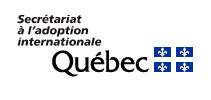Role of Certified Bodies
In Québec, since February 2006, the law requires that certified bodies assist with international adoptions.
Compulsory certification
Only certified bodies, that is, bodies possessing an official document of recognition issued by the Minister of Health and Social Services, may assist persons domiciled in Québec with the adoption process.
To be certified, the adoption body must satisfy the conditions set out in the Ministerial Order respecting the certification of intercountry adoption bodies![]() .
.
The certification indicates:
- the country for which it is issued;
- its period of validity;
- any conditions, restrictions or prohibitions attached.
The Minister may suspend, revoke or refuse to renew a certification on grounds provided for by law. The Minister retains a power of inspection and inquiry regarding the administration and operation of the certified body.
Verify certification
Before initiating contact with an individual or organization claiming to be an international adoption agent, make sure that they are certified as such by the Minister of Health and Social Services. You may also consult the list of certified bodies.
Mandate of the certified body
A certified body takes in hand the adoption process for the adopter. It acts as intermediary between the child's country of origin and the adopter. It supports the adopter throughout the adoption process.
In that capacity, the certified body must first ensure that the adopter meets the criteria of the country of origin.
To fulfil its role, representatives of the body travel regularly to the country of origin. The body develops and maintains relations with its collaborators and other contacts.
It must keep informed of the legal framework and practices in the country of origin in respect of adoption. It also stays informed, in particular, of various contexts:
- cultural
- economic
- social
- political
Thus, it can carry out its mandate to inform, support and conduct follow-up with the adopter.
Services and responsibilities of the certified body
The certified body provides various services to the adopter.
Among others, it must inform the adopter on
- the services it offers;
- the conditions in the country of origin;
- the adoption procedure;
- the documents required by the country of origin;
- the profile of the children proposed for adoption;
- the support services available in Québec after the child arrives;
- the procedures after the child arrives, such as the judicial procedure or application for Canadian citizenship, and conduct follow-up;
- any change likely to have an impact on how the proposed adoption is to proceed.
The certified body must also:
- See that the adoption process is pursued in the proper manner, in particular by the timely forwarding of all documents required by the authorities in Québec or the country of origin;
- Ensure that the adopters' file is complete, and contains all of the required original documents or certified true copies, before submitting it to the country of origin;
- Receive adoption proposals and give effect to them, taking into account the recommendations of the psychosocial assessment
- Conduct follow-up on the sending of the child's progress reports, in accordance with the requirements of the country of origin;
- Notify the Secrétariat à l'adoption internationale (SAI) of any change to the initial adoption plan;
- Cooperate with the SAI in research into family and medical antecedents or reunions, if applicable.
Obligations of the certified bodies
A certified body must, among others:
- be established for non-profit purposes under a statute of Québec;
- have its head office in Québec;
It must be directed and managed by persons qualified to work in the field, given their ethical principles, training and experience.
It is also bound to comply with the ethical principles and rules of conduct that are sensitive to the public interest and the context of international adoptions.
Certified bodies are held to respect the confidentiality of adoption files and the protection of personal information.
